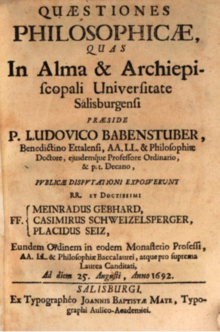Casimir Schweizelsperg
Casimir (Caspar) Schweizelsperg (also Casimirus, Schweizelsberger, Schweizelsperger or Schweizelsberg) (born December 3, 1668 in Rosenheim , † after 1722 ) was a German composer .
Life
Nothing is known about Schweizelsberg's parental home and education. In 1692 he can be traced as a respondent in Salzburg, as his name appears in a university publication from the University of Salzburg that year. He then became a Benedictine in Ettal Abbey , where he was ordained as a priest in 1696 , but was released from the monastery in 1703. On November 2, 1706, he married Anna Barbara Leder in Stuttgart (he converted to the Protestant faith for her, but later became Catholic again).
He was appointed court musician in Stuttgart in 1706. In 1708 he moved to the court in Ansbach in the same position. From 1712 to 1714 he was Kapellmeister of Johann Philipp Franz von Schönborn's private band in Würzburg .
Then he joined the court chapel of Margrave Karl III on March 3, 1714 . Wilhelm von Baden-Durlach entered Durlach as a composer and worked there until 1717. His wife, who followed him to Durlach in autumn 1714, is also on record there as an opera singer in 1717. His opera Die Romanische Lucretia (printed in 1715), which premiered in Durlach in 1714, has been preserved in its entirety and was performed again in Karlsruhe in 2015 . As early as April 23, 1717, Schweizelsperg in Durlach was released again.
In 1719 Schweizelsberg made a guest appearance in Nuremberg with a band of operists from Coburg (which he had probably founded with his wife in Coburg in 1717) after he had asked the local bandmaster Maximilian Zeidler (1680–1745) whether he could count on a license to play. A total of 4 operas from the Durlach repertoire were played in Nuremberg with cuts and changes. a. From the opera The Romanesque Lucretia some “improper” passages have been deleted.
From around 1720 he was employed as Kapellmeister for the Prince-Bishop, Cardinal Damian Hugo Philipp von Schönborn-Buchheim in Bruchsal (Speyer), but he lost this position again in 1722. Nothing is known about his further life.
plant
- Opera called Die Romanische Lucretia in a Singspiel performed at the Durlachische Schau Plaz Opera, Durlach 1715
- Acis and Galathea Opera, Durlach 1716
- Artemisia and Cleomedes Opera, Durlach 1716
- The unhappy love between the Egyptian Queen Cleopatra and the Roman Trium-Vir Antonio (libretto Johann Gottlob Dietrich , after Jean de La Chapelle ), opera, Durlach 1716
- Diomedes (libretto by Johann Gottlob Dietrich, after Jean-Louis-Ignace de La Serre ), opera, Durlach 1717
literature
- Renate Brockpähler : Handbook on the history of baroque opera in Germany. (Dissertation) University of Münster, Münster 1959. Lechte, Emsdetten 1964.
Web links
- Casimir Schweizelsperg in the Bavarian Musicians' Lexicon Online (BMLO)
- Biography at Oxford Music Online
- Biography at the Research Center for Southwest German Court Music of the 18th Century. of Heidelberg University
- Plot of the opera The Romanesque Lucretia
- Website of the Karlsruhe Palace Concerts for the revival of the opera Die Romanische Lucretia 2015
Individual evidence
- ↑ https://reader.digitale-sammlungen.de//resolve/display/bsb10835618.html
- ^ Adolf Sandberger: On the history of the opera in Nuremberg in the second half of the 17th and early 18th centuries. in Archive for Musicology Steiner, Stuttgart, 1918/19 p. 85 ff.
| personal data | |
|---|---|
| SURNAME | Schweizelsperg, Casimir |
| ALTERNATIVE NAMES | Schweizelsberger, Casimir; Schweizelsberg, Casimir; Schweizelsperger, Casimir; Schweizelsberg, Caspar |
| BRIEF DESCRIPTION | German composer |
| DATE OF BIRTH | December 3, 1668 |
| PLACE OF BIRTH | Rosenheim |
| DATE OF DEATH | after 1722 |
